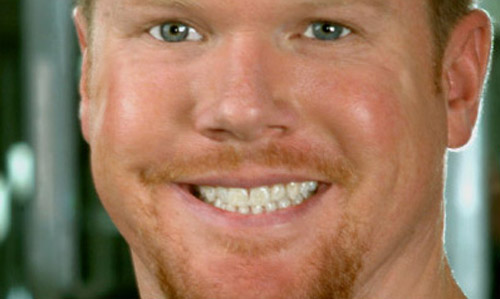Mark McGwire is Thrown Under the Bus Again and Again
Mark McGwire was considered for election to the National Baseball Hall of Fame by the Baseball Writers’ Association of America (BBWAA) in his third year of eligibility. Membership to the Hall of Fame requires seventy-five percent (75%) of the votes. McGwire did not even come close; only receiving votes on 21.9% of the ballots. It appears unlikely that McGwire will make it to Cooperstown after his noteworthy career was tarnished by suspicions of anabolic steroid use. Sports writers have clearly turned on McGwire, as have former teammates, and most recently his own brother. Steroid hysteria has tarnished the career of perhaps one of the nicest baseball players and certainly one of the most philanthropic.
Mark McGwire has become reclusive since retiring from baseball; he has actively avoided the media spotlight while living in a gated community in Irvine, California. His family has been a source of strength during the steroid witch-hunt. McGwire is most certainly deeply hurt that his younger brother is shopping around a book where he claims to have introduced his older brother to anabolic steroids in 1994. Jay McGwire, a former amateur bodybuilder and winner of the 2004 Contra Costa Bodybuilding Championships, writes that his older brother used steroids, such as Deca Durabolin, and human growth hormone (HGH) in a book written “out of love” for Mark McGwire. The book is called “The Mark McGwire Family Secret: The Truth about Steroids, a Slugger, and Ultimate Redemption.”
“Shortly after I won the Contra Costa Bodybuilding Championships in May of 1994, Mark took the plunge. I accompanied him to Sacramento where we met with my supplier and trainer, who explained to him how the different drugs would work on his body and answered a myriad of questions from Mark. Given Mark’s curiosity and lack of knowledge about steroids I saw from Mark, I would be shocked if Mark did something like what Jose Canseco claimed happened back in the early years....[M]ark began to use, but in low dosages so he wouldn’t lift his way out of baseball. Deca-Durabolin helped with his joint problems and recovery, while growth hormone helped his strength, making him leaner in the process. I became the first person to inject him, like most first-timers he couldn’t plunge in the needle himself. Later a girlfriend injected him.”
Steve Wilstein, the Associated Press reporter who discovered a bottle of androstenedione in McGwire’s locker during the thrilling Mark McGwire-Sammy Sosa home run chase in 1998, was the person that made the use of performance-enhancing drugs by Mark McGwire a topic of national discussion in spite of the fact that androstenedione was legal and not prohibited by MLB at the time; McGwire’s baby brother Jay introduced him to androstenedione. But it was Jose Canseco, the main whistleblower in Major League Baseball’s steroid era, who threw his former teammate under the bus and outed him as a user of anabolic steroids in the tell-all book, “Juiced: Wild Times, Rampant ‘Roids, Smash Hits, and How Baseball Got Big.”
”What we did, more times than I can count, was go into a bathroom stall together to shoot up steroids.
“That’s right: After batting practice or right before the game, Mark and I would duck into a stall in the men’s room, load up our syringes, and inject ourselves. I always injected myself, because I had practiced enough to know just what I was doing, but often I would inject Mark as well.”
The accusations in Jose Canseco’s book led to a 2005 Congressional hearing investigating steroids in baseball called “Restoring Faith in America’s Pastime: Evaluating Major League Baseball’s Efforts to Eradicate Steroid Use.” Mark McGwire was subpoenaed to discuss steroids at the hearing along with Jose Canseco and five other MLB players. McGwire did what most defense attorney would advise which is not to admit the use of performance-enhancing drugs, even if true, under oath.
“Asking me or any other player to answer questions about who took steroids in front of television cameras will not solve the problem. If a player answers ‘No,’ he simply will not be believed; if he answers ‘Yes,’ he risks public scorn and endless government investigations.... My lawyers have advised me that I cannot answer these questions without jeopardizing my friends, my family, and myself. I will say, however, that it remains a fact in this country that a man, any man, should be regarded as innocent unless proven guilty.” [...]
“I’m not here to talk about the past. I’m here to be positive about this subject.”
Mark McGwire’s decision to exercise his constitutional rights to avoid incriminating himself may have been a wise legal strategy but it was disastrous as a public relations strategy. McGwire’s refusal to admit (or deny) the use of performance-enhancing drugs disappointed everyone and may have permanently closed the door to the Hall of Fame.
Mark McGwire is one of the most sympathetic victims of contemporary steroid hysteria. Prior to the suspicions of steroid use, McGwire was one of the most well-respected, gentlemanly, and polite baseball players in the league. McGwire was certainly one of the most philanthropic; he founded the Mark McGwire Foundation for Children which awards grants to shelters and programs for physically and sexually abused children. McGwire makes a charitable donation to the foundation in the amount of $1 million every year.
“We catch a glimpse of the future when we look into the faces of our nation’s children...tomorrow’s generation is being shaped today by the environment in which they live,” Mark McGwire says about the goals of his foundation, “Whether or not this environment nurtures them to become caring and productive citizens rests in our hands.”
Sadly, Mark McGwire’s accomplishments as a baseball players and his generosity as a philanthropist will be overshadowed by the question of whether he used anabolic steroids.
Full text at SteroidRx.com...

 thinksteroids.com
thinksteroids.com

 thinksteroids.com
thinksteroids.com




